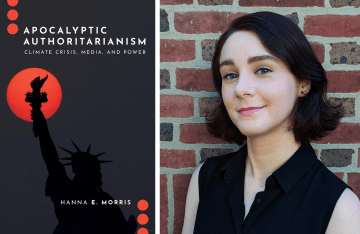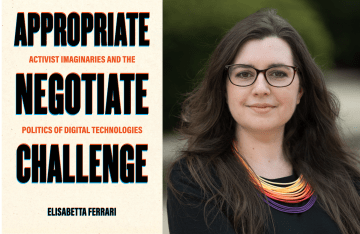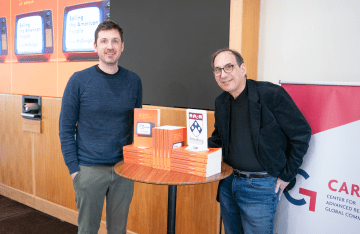Fashina Aladé (C'11) Delivers 2021 Annenberg Graduation Speech
Aladé encouraged graduates to be open to new possibilities, say “yes” when it feels right, and build community.
VIDEO: Fashina Aladé's full graduation speech
On May 16, following an introduction from graduating senior Caitlin McNamara (C'21), professor Fashina Aladé (C'11) delivered the 2021 commencement address for Annenberg's virtual Communication Major Graduation Ceremony. Aladé is an Assistant Professor at Michigan State University.
The text of her speech is as follows:
Thank you so much for that generous introduction. And thank you, Dean Jackson, Associate Dean Paxton, and the Annenberg School for inviting me to speak with you all today. To the Annenberg class of 2021, congratulations on making it to this incredibly momentous occasion, and for doing so despite the extraordinary challenges you've had to navigate this year. It's pretty wild for me to think that exactly 10 years ago, I was right where you are today, reflecting on how I had spent the last four years unsure of what life would look like next, but excited to take that next step towards starting my career as a children's media researcher. I want to tell you a bit about how I got to that point. I like to jokingly say that I've been in the field of Communication since I was 14. I went to a very small high school in central New Jersey that was actually called Communications High School at CHS. We got to take electives in areas like film, graphic design, and broadcast journalism. And that hands-on experience was a big part of my decision to apply to Penn and why I was so excited to major in Communication and take classes at Annenberg. My first big moment of career inspiration came when I was taking Dr. Cappella's Persuasion and Communication class. I signed up to be a research participant so that I could earn extra credit in the class. And by pure luck, the study that fit my schedule best was in Dr. Linebarger’s Children's Media Lab, which was tucked away in the ASC basement. The researchers hooked me up to this eye tracking device and explained that they were studying how adults eye gaze compared to children's eye-gaze when watching an early literacy program. Fifteen minutes of Martha Speaks later, I walked out of that room thinking, “Whoa, I had no idea that that was a thing you could study and make a career out of.”
I had always loved working with kids, but never quite felt called to become a teacher. And meanwhile, I was becoming immersed in this world of media effects research, and this just seemed like such a perfect blend of those two interests. So from that point on, I enrolled in every children and media class I could, which led to my second big “aha” moment. I was taking a seminar on children and media during my senior year. And we watched a documentary called “The World According to Sesame Street.” It talks about the history of Sesame Street here in the U.S.. where it was really the first show of its kind designed to reach children where they were, and then went on to highlight these amazing co-productions that Sesame was doing all over the world, where they don't just take American Big Bird and dump him in whatever the native language is.
They work with local production teams to create programming that addresses the particular needs of those children. They worked in Kosovo to help children deal with the aftermath of the civil war. In South Africa, they introduced a Muppet who was HIV-positive to help children deal with the immense loss and grief of the AIDS epidemic and to show that it was still okay to play with and to hug their friends who were HIV-positive. By the end of the film, I had laughed, I had cried, and most importantly, I had decided that that was what I wanted to do with my life. I wanted to be a part of the process of making children's lives better via media. Meanwhile, the summer before senior year, I had landed a job working as a research assistant for Dr. Amy Jordan, whom some of you may remember Dr. Jordan was an amazing mentor, that she is saw a spark in me, a keen interest in the world of children and media.
She also saw me grappling with this decision of whether I should apply to grad school. She really helped me understand that going to graduate school could open a lot of different doors for me. She pointed out that many of the people featured in that Sesame Street documentary, the people who I was convinced were doing my dream job, were people who had earned doctorate degrees. And so I applied to grad schools with faculty specializing in children and media. I didn't know exactly what I wanted to do afterwards, but I knew that I wanted to somehow contribute to our understanding of how media can be designed to better the lives of children and families. And now in my life as a professor, that's what I get to do every day. In addition to teaching wonderful students like you all, I get to pursue the questions that I'm passionate about and to conduct research that helps children and families use media and technology to grow and develop in positive, healthy ways.
Lately in my work I've been looking at racial diversity and representation in children's media. We've seen a lot of evidence this year of our society dealing with this long overdue reckoning with white supremacy and racial oppression. Traditionally, media has only exacerbated those problems, but we have seen a growing number of positive, inclusive portrayals in certain sectors of the media industry. In my research, I've been focusing on television that's designed to get young children engaged in math and science. And I've been trying to answer the question of who exactly is modeling STEM engagement for these young viewers. How is television shaping their beliefs about what a scientist looks like? The answer is a bit complicated: On the one hand white male characters are no longer dominating the screen, the way that they have in the past. What we're seeing instead is in these ones, mostly animated programs, an increase in slightly tan or light Brown characters, as well as a wide array of non-human skin tones.
Now you and I as adults might be able to see a green, a blue, and a purple character and understand that that's meant to represent racial diversity. But are five-year-olds able to put that together? We know from that lots of studies in Communication and Developmental Psychology that young kids are really bad at understanding these types of subtle, implicit, positive messages that are often embedded into TV programs. And so the studies I'm designing now are meant to help us figure all that out, to figure out what young kids are understanding from these cues, how parents and teachers can help them understand these subtle messages and importantly how content creators can do an even better job of representing diverse characters in realistic, authentic ways. Now, I know that out of all you brilliant 2021 Annenberg graduates, very few of you may be planning to pursue research careers. But I'm sharing the highlights of my journey with you today in the hopes that it will help you to recognize and discover some of your own “aha moments” to that end.
I want to close by offering three nuggets of wisdom that I've gleaned from my own experiences, and that I hope will be useful to you as you carve out your own exciting paths ahead. Number one: Be open. It's great to be driven to know what you want out of life and to go out and get it. But our worlds as individual humans are inevitably small, and there's just no telling where you might find that “aha” moment, that extra credit point in the basement of Annenberg that helps you see a new path or a new way forward. Number two: Don't be afraid to say yes. Now giant caveat here: I'm sure that I'm talking to some fellow overachievers in the audience. So please do take this piece of advice with caution and make sure that you're always putting your physical and mental health first. But that said, looking back at my life and career thus far, a lot of seemingly random and superfluous yeses turned out to be wonderful opportunities that connected me with amazing people who helped me get where I am today.
And that leads to my last piece of advice. Number three: Build community and give back to those communities who have built and strengthened you. Not every one of my yeses has had direct benefit to me or to my own career. A lot of those “yes” moments were really community-building moments, seeing a place where I could make a difference and volunteering to jump in and help. I did a lot of this, especially in grad school, which was a little controversial because grad school is a time where people really tell you to just keep your head down and get your work done. There was almost a sense of shame in participating in extracurriculars or doing anything that wasn't directly tied to my work, which was really a huge shift from what it was like at Penn. And I suspect that many of you will feel a similar culture shock in your first jobs, but I really truly believe that those communities that I helped build added so much benefit and enrichment to my life.
And you just never know which person you've helped or what act of service or kindness, no matter how small, may be remembered by someone who might be in a position someday to return the favor. Now, I definitely don't want to sit here and pretend like I have everything all figured out. I'm still quite junior in my career. And I know that I have so much to learn and probably a few more career twists and turns ahead of me. What I try to tell myself every day is that my job is to be the very best me that I can be right here right now in this moment. And to trust that that's enough that I am enough and that as long as I remain open to new possibilities, that things will play out the way they're meant to. And so today to the Annenberg class of 2021 to a group of students who have already triumphed in the face of remarkable adversity, I say that same thing to you.
Your job is to simply be the very best you that you can be in this moment, given all the tremendous obstacles that life and a global pandemic have thrown your way. And I truly believe that as long as you're open to new possibilities, that you say “yes” when it feels right, and that you continue to build community along the way, that you will have brilliant and fulfilling lives and careers ahead of you.
Congratulations class of 2021, and congratulations to your families and support systems that have guided you here today. I am so very happy for each and every one of you.



